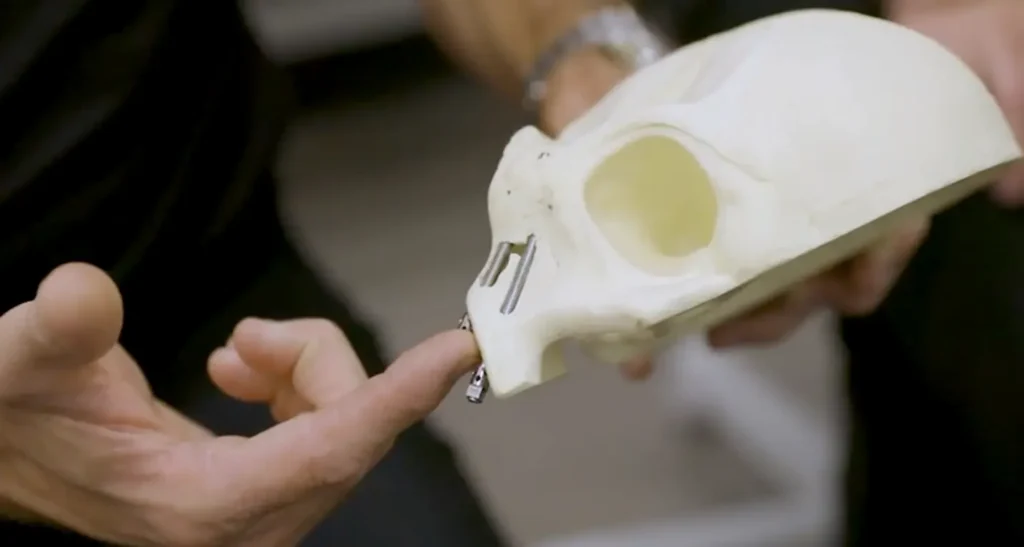Dental implant placement is one of the preferred methods for replacing missing or damaged teeth. However, it’s natural to feel anxious about any procedure involving teeth, as you may worry about the amount of pain involved.
This concern is even more relevant as dental implant placement is a surgical procedure. While concerns about pain are common with any dental surgery, it’s important to note that the procedure itself is generally not painful.
This is because we help patients overcome dental fear with IV sedation dentistry before the procedure begins, significantly reducing discomfort. However, it’s worth mentioning that pain perception varies from person to person. Some may experience minimal discomfort, while others might be more sensitive.
What are Dental Implants?
Dental implants are a popular solution for replacing missing or damaged teeth. They involve placing a metal post into the jawbone, which acts as a root for the new tooth. This is followed by attaching your new tooth to the post.

It’s natural to question if getting a dental implant is painful. While the procedure does involve surgery, it’s important to note that pain varies from person to person. However, generally, patients do not find the procedure painful because they receive anesthesia, which numbs the area and prevents pain during the surgery.
How Painful is a Dental Implant Procedure?
Understanding the pain level during a dental implant procedure is a common concern. The truth is, with modern anesthesia and sedation techniques, the actual procedure is not painful. Before starting, dentists use medications to numb the area thoroughly, ensuring you won’t feel pain during the implant placement.
Patients often describe feeling pressure but not pain. After the anesthesia wears off, you might experience some discomfort, similar to what you would feel after other dental procedures. This discomfort is usually manageable with over-the-counter pain relievers and doesn’t last long.
Post-Procedure Pain and Recovery
After a dental implant surgery, it’s normal to experience some pain and discomfort. This usually happens as the anesthesia wears off. The level of discomfort varies from person to person but is generally manageable.
Immediately following the procedure, you might notice swelling and minor bleeding, which are normal parts of the healing process. Pain levels typically peak within the first 48 to 72 hours and then gradually decrease. Your dentist will likely recommend over-the-counter pain medication to help manage any discomfort. Applying ice packs to the cheek near the implant site can reduce swelling.
It’s important to follow your dentist’s post-surgery care instructions carefully. This includes eating soft foods, maintaining oral hygiene with gentle cleaning around the implant site, and possibly using prescribed mouthwashes to keep the area clean and aid in healing.
Managing post-surgery pain effectively involves taking medications as advised, resting, and avoiding strenuous activities for a few days. With proper care, recovery is smooth, and you can return to normal activities shortly after the procedure, with the implant site healing over time.
What are the Factors That Affect Pain Levels?
The amount of pain you might feel after getting a dental implant can depend on several factors. Everyone’s pain tolerance is different, so what feels minor to one person could feel more intense to another.
Your dentist’s experience and technique also matter. A dentist trained and skilled in implant surgery can minimize tissue damage and reduce post-operative discomfort. Choosing the right dental professional who uses the latest techniques and follows the best practices can significantly impact your comfort levels during and after the procedure.
Other factors that can influence pain levels include your overall health, how well you follow post-operative care instructions, and whether you smoke. Smoking, in particular, can slow down the healing process and increase the risk of complications, which might lead to more discomfort.
Long-Term Comfort and Functionality of Dental Implants
Dental implants are designed for long-term comfort and functionality. Once they have healed and integrated with the jawbone—a process called osseointegration—they become a permanent part of your mouth. This healing process can take several months, but it ensures the implant is stable and strong, much like a natural tooth root.
Patients often report that once healed, dental implants feel like their own teeth. They don’t experience discomfort during daily activities such as eating, speaking, or brushing. In fact, because dental implants are anchored in the jawbone, they provide a level of comfort and functionality that is difficult to achieve with other types of dental restorations, like bridges or dentures, which may slip or cause discomfort.
The success and comfort of dental implants also depend on maintaining good oral hygiene and regular dental check-ups. Proper care ensures that your implants last a long time and remain a comfortable, functional part of your dental health.
How to Minimize and Manage Pain After Dental Implant Procedure
Minimizing and managing pain after a dental implant procedure starts with choosing the right dental professional. A skilled and experienced dentist will not only perform the procedure efficiently but also provide you with comprehensive aftercare instructions. These instructions are crucial for reducing discomfort and speeding up the healing process.

Following the post-operative care instructions is essential. These include the following:
- Taking prescribed medications on schedule.
- Applying ice packs to the cheek near the implant site.
- Eating soft foods to avoid putting pressure on the implant site.
- Maintaining oral hygiene with gentle cleaning techniques.
- Avoid smoking and alcohol, as this can impede the healing process.
- Regular follow-ups with your dentist.
By choosing a competent dental professional, following their care instructions, and attending follow-up appointments, you can minimize discomfort and ensure a successful dental implant procedure.
Are You Considering Getting a Dental Implant?
Many people considering dental implants worry about the pain involved in the procedure. However, it’s important to know that dental implant surgery is highly manageable in terms of discomfort. With advancements in dental techniques and anesthesia, patients typically experience minimal pain during the procedure.
If you’re considering dental implants, schedule a consultation with us today to receive a personalized assessment and have all your concerns addressed directly. Remember, dental implant surgery has a high success rate. For many, the benefits of having a stable, long-lasting solution for missing teeth far outweigh the temporary discomfort that may come with the procedure.
Consulting with a dental professional can help demystify the process and put your mind at ease. Let’s help you get your beautiful smile back!
Frequently Asked Questions
What hurts more, tooth extraction or implant?
Tooth extraction and dental implant procedures involve different types of discomfort and pain levels. Generally, tooth extraction is considered to be more immediately painful, especially if the tooth is impacted or the extraction is complicated. However, pain management techniques and local anesthesia can effectively control this pain. Dental implant surgery, on the other hand, is less about pain and more about slight discomfort or pressure during the procedure, thanks to anesthesia. Post-procedure discomfort can be similar, but pain management strategies make both procedures manageable.
How long does it take to recover from a tooth implant?
Recovery time from a dental implant procedure can vary depending on several factors, including the complexity of the surgery and the individual’s overall health. Typically, initial healing, where you might experience swelling and discomfort, lasts for about 1-2 weeks. However, the complete integration of the implant with the jawbone (osseointegration) can take anywhere from 3 to 6 months. Patients can usually go about their daily activities with minimal disruption during this time.
What hurts more, a dental implant or a root canal?
The experience of pain is subjective, but with effective local anesthesia, both dental implants and root canals can be performed with minimal pain during the procedure. Patients often report feeling pressure rather than pain. Post-procedure discomfort may occur with both, but this is generally manageable with medication. The perception of pain can also depend on the individual’s pain tolerance and the complexity of the procedure.
What dental procedure hurts the most?
Pain perception varies widely among individuals, but procedures involving surgery, such as tooth extractions (especially impacted wisdom teeth) and periodontal surgery, are often considered more painful due to the invasiveness and the mouth area being treated. However, advancements in dental anesthesia and pain management techniques have significantly reduced the discomfort associated with these procedures, making them much more manageable for patients.





